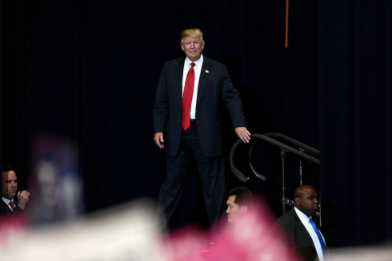Breaking
Trump wants $108M for deeper ports; Corps adds $56M boost

President Donald Trump wants $108 million to deepen harbours for two U.S. seaports, while other ports scrambling to make room for larger cargo ships will benefit from a boost of more than $56 million already approved by Congress. (Photo: Gage Skidmore/Flickr)
SAVANNAH, Ga. — President Donald Trump wants $108 million to deepen harbours for two U.S. seaports, while other ports scrambling to make room for larger cargo ships will benefit from a boost of more than $56 million already approved by Congress.
Ports from New England to Texas are seeking more than $4.6 billion in federal and state funding to deepen their harbours. They’re playing catch-up after the Panama Canal finished a major expansion last summer that is sending supersized ships to U.S. ports on the Atlantic and Gulf Coasts.
Most of those ports have waterways that are too shallow for such big ships to navigate unless they carry lighter loads or travel at high tides.
While Congress has authorized 15 total port projects to pursue deeper and wider shipping channels, Trump’s proposed budget released Tuesday requests money for only two of them in the 2018 fiscal year that starts Oct. 1. Deepening projects for Boston and Savannah, Georgia, would essentially split $108 million.
But not every port left out of Trump’s budget request came away empty-handed. The Army Corps of Engineers, which oversees maintenance and construction on U.S. waterways, on Wednesday evening released its spending plan for discretionary funds recently approved by Congress.
That plan includes more than $56 million for five harbour-deepening projects, including $17.5 million for deepening to begin at the Port of Charleston, South Carolina, and the Port of Jacksonville, Florida. For projects still in the study and permitting phase, $2.8 million will go to Port Everglades in Fort Lauderdale, Florida, and $557,000 for the Sabine-Neches waterway that serves three Texas ports.
The discretionary funds should give a guaranteed boost to the Army Corps’ chosen harbour projects. Trump’s proposed $4.1 trillion budget for fiscal 2018, meanwhile, faces a long and uncertain road in Congress.
“Now you’ve got the congressional money and you’re going to see what’s coming to you right now,” said Jim Walker, navigation policy director for the American Association of Port Authorities. “You may be a year away from seeing the (fiscal) 2018 money.”
The Port of Boston, where officials hope to start deepening the harbour later this year, may turn out to be the biggest winner. In additional to Trump’s $58 million request for the project, the Army Corps added $18.2 million in discretionary funding.
And while Trump’s request of $50 million for Savannah, the fourth-busiest U.S. container port, is 17 per cent more than President Barack Obama secured in his last budget, it’s still only half of what Georgia officials said was needed to keep the $973 million project on schedule.
Sen. Johnny Isakson, a Georgia Republican, said in a statement he was “disappointed by the failure of the Army Corps of Engineers” to route some of the discretionary funds to Savannah. He made no mention of Trump’s budget request.
“Rest assured that I will continue fighting in Congress to secure sufficient funding for this worthy project to be completed without further delays,” Isakson said.
Federal funding for deeper harbours proved tough to get under Obama as well. And while Congress gets the final say over the federal budget, the president’s recommendation on specific port projects still carries weight. That’s because a ban on so-called earmark spending adopted years ago prohibits lawmakers from inserting line items for their own pet projects.
Georgia ensured dredging of the Savannah River got started in 2015 by spending state taxpayers’ $266 million share upfront. South Carolina was prepared to do the same, with $300 million in state funding set aside to begin deepening the Charleston harbour this fall. The federal money from the Corps was welcomed.
“The significance of this funding for the timeline of our deepening project cannot be overstated — it is tremendous news for Charleston,” Jim Newsome, CEO of the South Carolina Ports Authority, said in a statement.





















